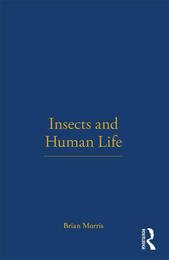
|
Insects and Human Life
Paperback / softback
Main Details
| Title |
Insects and Human Life
|
| Authors and Contributors |
By (author) Brian Morris
|
| Physical Properties |
| Format:Paperback / softback | | Pages:320 | | Dimensions(mm): Height 216,Width 138 |
|
| Category/Genre | Insects |
|---|
| ISBN/Barcode |
9781845200756
|
| Classifications | Dewey:595.716 |
|---|
| Audience | | Undergraduate | | Postgraduate, Research & Scholarly | | Professional & Vocational | |
|---|
|
Publishing Details |
| Publisher |
Bloomsbury Publishing PLC
|
| Imprint |
Berg Publishers
|
| Publication Date |
1 January 2006 |
| Publication Country |
United Kingdom
|
Description
This pioneering book looks at the importance of insects to culture. While in the developed West a good deal of time and money may be spent trying to exterminate insects, in other cultures human-insect relations can be far more subtle and multi-faceted. Like animals, insects may be revered or reviled - and in some tribal communities insects may be the only source of food available. How people respond to, make use of, and relate to insects speaks volumes about their culture. In an effort to get to the bottom of our vexed relationship with the insect world, Brian Morris spent years in Malawi, a country where insects proliferate and people contend. In Malawi as in many tropical regions, insects have a profound impact on agriculture, the household, disease and medicine, and hence on oral literature, music, art, folklore, recreation and religion. Much of the complexity of human-insect relations rests on paradox: insects may represent the source of contagion, but they are also integral to many folk remedies for a wide range of illnesses. They may be at the root of catastrophic crop failure, but they can also be a form of sustenance. Weaving science with personal observations, Morris demonstrates a profound and intimate knowledge of virtually every aspect of human-insect relations. Not only is this book extraordinarily useful in terms of the more practical side of entomology, it also provides a wealth of information on the role of insects in cultural production. Malawian proverbs alone provide many such delightful examples - 'Bemberezi adziwa nyumba yake' ('The carpenter bee knows his own home'). This final volume in Morris' trilogy on Malawi's animal and insect worlds is certain to become a classic study of uncharted territory - the insect world that surrounds us and how we relate to it. Praise for 'The Power of Animals': 'Although based upon examination of a single culture, Morris incorporates ecological and anthropological concepts that expand this study of attitudes to nature to create a comprehensive ethnographic analysis, both informative and very readable.' Choice 'The Power of Animals deserves to become an anthropological landmark, setting the stage for a new generation of ethnographies that give proper weight and significance to people's interactions and interrelations with other animals and the natural world. The cultural depth and richness that emerges from Morris's approach makes other comparable studies seem shallow in comparison.' Anthrozoos Praise for Morris' 'Animals and Ancestors': 'Morris defends with great wit and intelligence his 'philosophical' background and the methodology he uses ...well researched, well edited, offers a valuable bibliography, and is written in a language that attracts attention, avoiding academic jargon ...an example of ethnography at its best.' Zeitschrift fur Ethnologie
Author Biography
Brian Morris is Emeritus Professor of Anthropology, Goldsmiths College, University of London
Reviews'For social anthropology, this book has the comparative advantage over other monographs dealing with people of the Maravi-cluster and beyond as Morris uses the interface with natural empirical sciences and draws comparative examples from other parts of the world whenever available and accessible... Morris enriches not only the literature on Malawi, but the international debate on how to understand the life of human beings whose struggle for survival is still very much determined and dependent on how they interact with the natural world.' Zeitschrift fur Ethnologie 'Brian Morris brings to this work his lifelong experience of Malawian fauna and ethnography, together with enviable skills as a tireless field naturalist and consummate ethnographer. Simultaneously the iconoclast and extoller of the virtues of sound empiricism, Morris provides us here with a comprehensive, innovative and fascinating account of the connections between culturally embedded insect knowledge in Malawi and the role which insects play in local human ecology in its widest sense. A definitive study.' Roy Ellen, University of Kent at Canterbury 'A pioneering exercise by an anthropologist in the new academic field of Cultural Entomology ... This is an important work, a valuable addition to Morris's already substantial contribution.' Roy Willis, University of Edinburgh "Insects and Human Life' is a thorough, meticulous and very detailed ethno-entomological account.' Jonathan McKee, Anthrozoos journal
|